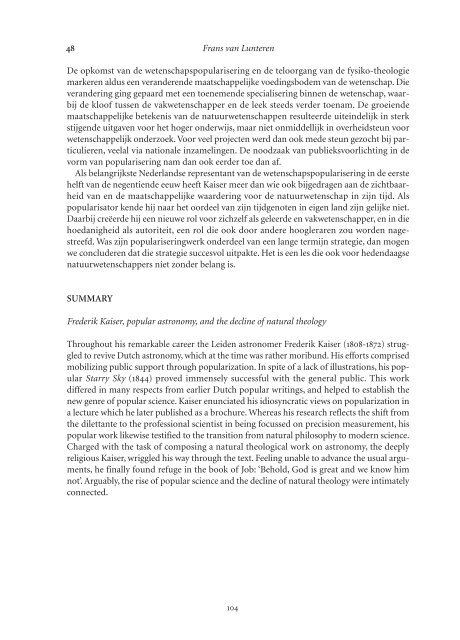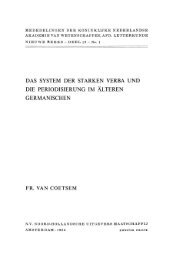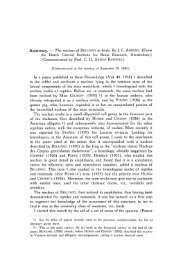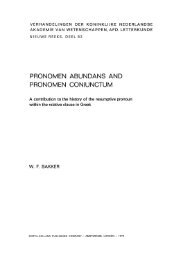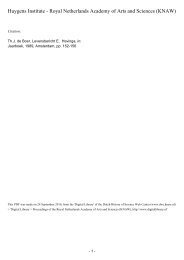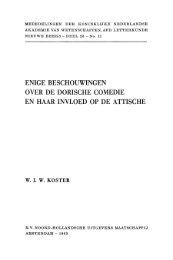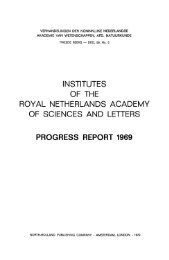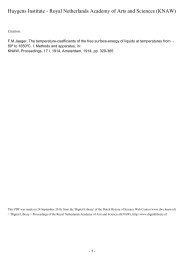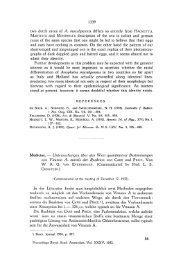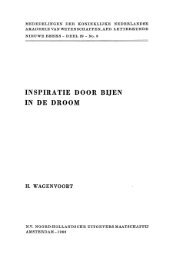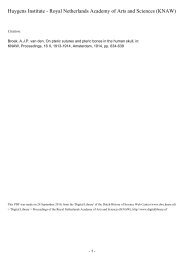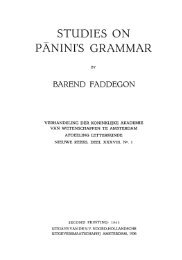Frederik Kaiser (1808-1872) - DWC - KNAW
Frederik Kaiser (1808-1872) - DWC - KNAW
Frederik Kaiser (1808-1872) - DWC - KNAW
You also want an ePaper? Increase the reach of your titles
YUMPU automatically turns print PDFs into web optimized ePapers that Google loves.
48<br />
Frans van Lunteren<br />
De opkomst van de wetenschapspopularisering en de teloorgang van de fysiko-theologie<br />
markeren aldus een veranderende maatschappelijke voedingsbodem van de wetenschap. Die<br />
verandering ging gepaard met een toenemende specialisering binnen de wetenschap, waarbij<br />
de kloof tussen de vakwetenschapper en de leek steeds verder toenam. De groeiende<br />
maatschappelijke betekenis van de natuurwetenschappen resulteerde uiteindelijk in sterk<br />
stijgende uitgaven voor het hoger onderwijs, maar niet onmiddellijk in overheidsteun voor<br />
wetenschappelijk onderzoek. Voor veel projecten werd dan ook mede steun gezocht bij particulieren,<br />
veelal via nationale inzamelingen. De noodzaak van publieksvoorlichting in de<br />
vorm van popularisering nam dan ook eerder toe dan af.<br />
Als belangrijkste Nederlandse representant van de wetenschapspopularisering in de eerste<br />
helft van de negentiende eeuw heeft <strong>Kaiser</strong> meer dan wie ook bijgedragen aan de zichtbaarheid<br />
van en de maatschappelijke waardering voor de natuurwetenschap in zijn tijd. Als<br />
popularisator kende hij naar het oordeel van zijn tijdgenoten in eigen land zijn gelijke niet.<br />
Daarbij creëerde hij een nieuwe rol voor zichzelf als geleerde en vakwetenschapper, en in die<br />
hoedanigheid als autoriteit, een rol die ook door andere hoogleraren zou worden nagestreefd.<br />
Was zijn populariseringwerk onderdeel van een lange termijn strategie, dan mogen<br />
we concluderen dat die strategie succesvol uitpakte. Het is een les die ook voor hedendaagse<br />
natuurwetenschappers niet zonder belang is.<br />
SUMMARY<br />
<strong>Frederik</strong> <strong>Kaiser</strong>, popular astronomy, and the decline of natural theology<br />
Throughout his remarkable career the Leiden astronomer <strong>Frederik</strong> <strong>Kaiser</strong> (<strong>1808</strong>-<strong>1872</strong>) struggled<br />
to revive Dutch astronomy, which at the time was rather moribund. His efforts comprised<br />
mobilizing public support through popularization. In spite of a lack of illustrations, his popular<br />
Starry Sky (1844) proved immensely successful with the general public. This work<br />
differed in many respects from earlier Dutch popular writings, and helped to establish the<br />
new genre of popular science. <strong>Kaiser</strong> enunciated his idiosyncratic views on popularization in<br />
a lecture which he later published as a brochure. Whereas his research reflects the shift from<br />
the dilettante to the professional scientist in being focussed on precision measurement, his<br />
popular work likewise testified to the transition from natural philosophy to modern science.<br />
Charged with the task of composing a natural theological work on astronomy, the deeply<br />
religious <strong>Kaiser</strong>, wriggled his way through the text. Feeling unable to advance the usual arguments,<br />
he finally found refuge in the book of Job: ‘Behold, God is great and we know him<br />
not’. Arguably, the rise of popular science and the decline of natural theology were intimately<br />
connected.<br />
104


